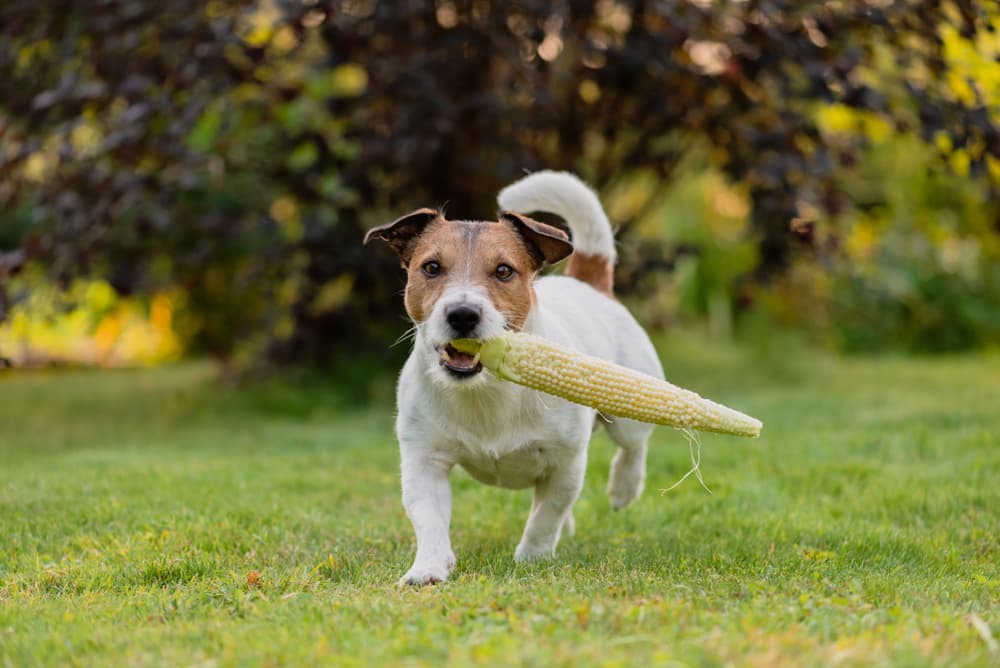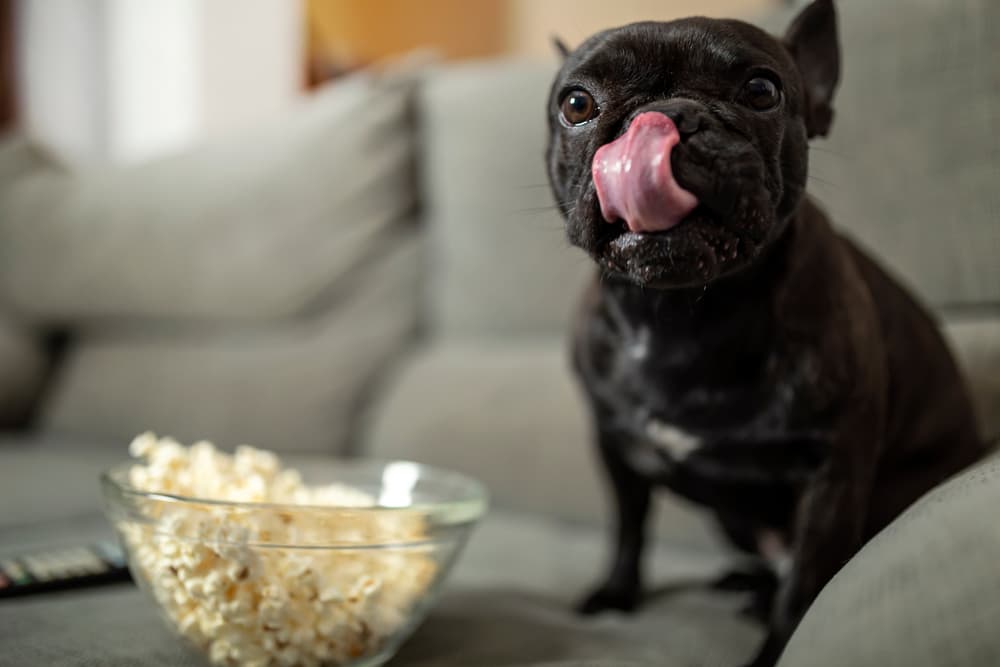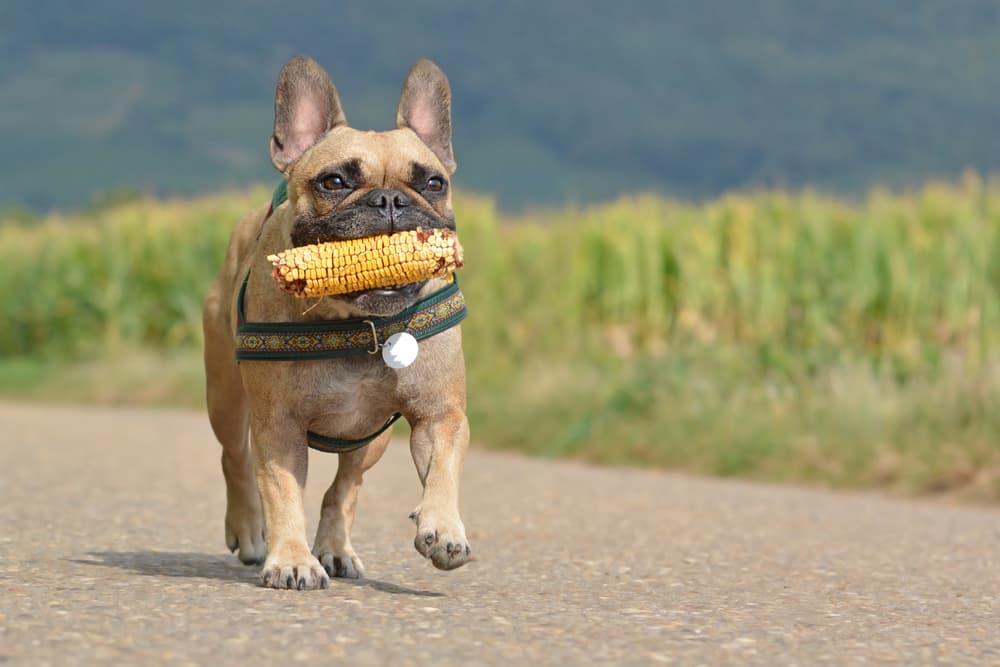Can Dogs Have Corn?

According to the USDA, the United States is the largest producer, consumer, and exporter of corn in the world.1 And whether you prefer your corn buttered and bursting with farm-fresh flavor, ground and pressed into a tortilla, or popped and salted to accompany your favorite movie, we humans have plenty of delicious ways to enjoy this multi-purpose ingredient. But what if your dog shimmies up next to you for a taste while you’re chowing down on your favorite corn dish? Many pet parents find themselves wondering: Can my dog eat corn? Is corn bad for dogs?
As it turns out, the short answer is: It depends. However, if your dog has eaten some corn and you’re worried about their health, or even if you’re just considering adding corn to your dog’s diet, you’ll need more than that.
That’s why we asked a veterinarian to clarify if corn is good for dogs, or if you need to avoid feeding corn to them altogether. So here’s everything pet parents need to know about dogs and corn.
Can Dogs Eat Corn?

Yes, you (and your pup) may be happy to hear that dogs can safely eat corn.
“Corn is typically considered non-toxic for dogs and is safe for them to consume,” says veterinarian Dr. Tina Wismer, DVM, Senior Director of the ASPCA Animal Poison Control Center.
However, what you put on your corn or how you feed corn to your dog could be a health concern. So here’s a helpful guide that answers the questions pet parents most commonly ask about feeding dogs corn.
Can Dogs Eat Corn on the Cob?
While corn itself isn’t hazardous to dogs, if you want your pup to enjoy fresh corn on the cob, you should know that feeding your dog this summer staple could be risky.
“The biggest risk of feeding a dog corn on the cob would be the cob being ingested and causing a foreign body obstruction,” explains Wismer.
She notes that if you do choose to feed your dog fresh corn, always cut the kernels from the cob to avoid the chance of obstruction.
Can Dogs Eat Corn Cobs?

Even if your super-chewer is hankering to gnaw on some corn cobs, we repeat: Do not feed your dogs corn cobs. Opt for a more appropriate (and safe) dog chew or toy to occupy your pup. And take care to discard old corn cobs safely to prevent dogs who might be tempted to raid the garbage.
“Corn cobs can also perforate the digestive tract if consumed by pets,” says Wismer. “Surgery is often required to remove these types of obstructions in most cases.”
You should also keep corn husks away from your pup, as they are difficult for dogs to digest.
Can Dogs Eat Popcorn?
Popcorn is a super popular snack for humans, which means it’s more than likely your hungry dog might be right there at your feet, begging you for a few pieces. Popcorn can be a great snack to share with your pet — if it’s properly prepared.
“Air-popped popcorn is only about 35 calories per cup, making it a great snack for pets,” says Wismer. “Popcorn pieces make it easy to toss your pup a snack throughout the day without loading them up on calories. Just be sure not to use any butter or salt on your dog’s popcorn.”
Butter and oils are high in fat, which could cause gastrointestinal distress, or even lead to more serious problems like pancreatitis or dog obesity.
Finally, it’s not only what’s on your popcorn or how it was prepared that could endanger your pet. Popcorn packaging can pose a suffocation hazard if your dog gets hold of an unattended snack bag, according to the Food and Drug Administration.2
Can Dogs Eat Canned Corn?
Dogs can eat canned corn, but Wismer warns to watch for the sodium content in prepared foods, which can vary widely. Salt is often added to canned foods as a preservative, which can negatively affect your dog’s health.
Can Dogs Eat Baby Corn?
Fun fact: Baby corn is just corn that has been picked before it’s matured into your regular ear of corn on the cob.3 While the cob isn’t hard or big enough to present a choking hazard, baby corn often comes in a can or brined. So, like canned corn, it could be loaded with salt, making it a poor choice for your dog’s health.
Is Corn Good for Dogs?

Nutritionally, corn holds a lot of positive health benefits for your pup. It is a whole grain, which means it’s a high-quality complex carbohydrate, which helps provide dogs with energy. Fresh corn is also a great source of nutrients such as phosphorus, magnesium, manganese, potassium, and folate. Dogs can eat corn raw or cooked. Another bonus: Corn is loaded with fiber, which is beneficial to your dog’s gut and digestion.
Is Corn Bad for Dogs in Dog Food?
In recent years, you may have noticed a growing trend toward grain-free dog food diets. Kibble, in particular, has come under scrutiny, because some manufacturers load it up with inexpensive grains to reduce costs. Some manufacturers claim that grain-free dog food is also beneficial to dogs with food sensitivities or allergies.
This has caused some pet parents to wonder if corn is being used as a “filler” in their dog’s food and whether it could harm their dog’s overall health and nutrition.
However, Wismer says that corn is seldom the cause of dog health issues, and you don’t need to avoid it in dog food specifically.
“Since dogs are omnivores, they can eat both meat and plants. A corn-free diet is a nutritional fad similar to paleo-type diets in humans,” explains Wismer. “Most allergies in dogs are due to the proteins, not grains.”
However, if you are concerned about corn in your dog’s food, you can check to make sure your dog food meets the nutritional standards set by the Association of American Feed Control Officials (AAFCO), as well as discuss feeding options with your veterinarian.
Precautions When Feeding Corn to Dogs

To recap and reap the biggest benefits from feeding your dog corn, here’s what petty parents need to know:
- It’s fine to feed your pup fresh corn kernels (carefully removed from the cob) and plain air-popped popcorn. In fact, this multi-functional ingredient could provide your pup with a nutritional boost.
- However, Wismer cautions against feeding your dog corn that is covered in butter, oil, or salt, as well as canned types of corn. Also, do not give your dog an entire ear of corn on the cob to munch on. That safety tip can help you avoid a trip to the emergency vet, as well as the risk of the cob obstructing your dog’s digestive tract.
- Be sure to properly dispose of corn cobs (as well as the husks) if you plan to enjoy fresh corn on the cob near your pup. And always restrict your dog from food waste or garbage cans that could contain harmful foods or packaging.
If you keep these helpful guidelines in mind, you can snack safely with your corn-loving canine companion!









